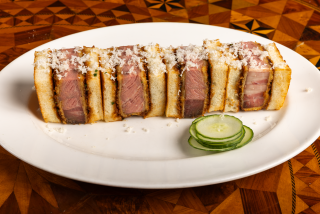Drinking on It, Thinking on It : Israel: The regulars at the Bonanza bar and grill are, for the most part, in favor of a land-for-peace compromise.
- Share via
TEL AVIV — The regulars at the raffish Bonanza bar and grill--Tel Aviv’s version of the bar in the American TV show “Cheers”--are reserving judgment on the current peace talks in Madrid.
The steady customers are an informal, sardonic lot, most of them reserve officers who fought Israel’s wars and have seen the Middle East at the sharp end.
Yet, by and large, they are prepared to make some kind of land-for-peace compromise with the Arabs, a goal that Prime Minister Yitzhak Shamir seems to have rejected so far.
“If we want peace, we’ve got to give away some pieces,” observed the Bonanza’s proprietor, Shai Stein, a sturdy, 44-year-old paratrooper colonel now in the reserves. He was referring to the occupied territories.
“So far, Madrid is mostly talk about talks.”
The crowd in the Bonanza, whose decor is simple, almost Spartan, (“It’s the people who decorate this place,” says Stein), is drawn from Israel’s literary, political, military and journalistic circles. They are more given to relaxing over food and wine than engaging in strategic discussions.
Like “Cheers,” the Bonanza has an array of faithful steadies: the impresario who went broke during the Gulf War when nobody attended his theatrical events; the war hero turned arms dealer who did a short hitch in the slammer; popular columnist Shaul Evron, who arrived the day after the first Scuds hit Tel Aviv last January with two bottles of fine Barolo wine (“my gas mask”); the general, a former military secretary to the prime minister; Yebbe, the “people’s poet” whose verse runs daily in a newspaper; legendary Shaul Biber, who fought in the pre-independence Palmach and organized USO-type shows for the Israel Defense Forces, and Detroit-born gadfly Zeev Chafets, editor of the magazine Jerusalem Report, press spokesman for then-Prime Minister Menachem Begin and part-time rock singer.
The women in the Bonanza are attractive--thirtysomething and fortysomething--and generally divorced.
While Jerusalem is mostly closed down tight during the Sabbath, less-observant and more-tolerant Tel Aviv remains open--and the Bonanza is wide open. On a recent Friday night, the place was packed; everyone was eating, drinking, and dancing to a combo playing in one corner.
Ronnie Naftaly, who commanded the forward recon outfit of an armored division in the 1973 and 1982 wars and still bears the battle scars on his cheek, now runs one of Israel’s biggest mineral water firms.
Finishing a grilled piece of fish, he commented: “We are optimistic that something will emerge from the talks, though we can’t yet see what. Most of us are in the middle of the road and would like to see some compromises made on giving back land.”
Looking around the room, the glamorous, blonde novelist Dorrit Landes observed: “I think the regulars here have one thing in common: They all fought for the country. They are all comrades-in-arms. They’ve got a frontier mentality. The fact that an arms dealer may have broken the law doesn’t put off people here.”
As for Madrid, she added: “Up to now, it’s been all show and little substance. Any real progress will be made behind closed doors.”
Chafets, who served as Begin’s press aide during the successful peace negotiations with Egypt a dozen years ago, reflected:
“It’s a mistake to get too excited or too depressed, too soon. We had lots of hard bargaining before we came to a deal. So you can expect a hundred glitches before you get any real progress in these talks.”
In jeans and sport shirt, Shai Stein clearly delights in playing host to his polyglot regulars in the bar on Trumpeldor Street, two blocks from the beach.
During the missile attacks in January when Tel Aviv was called Scud City and under curfew, Stein opened the Bonanza as a refuge for his friends, though he jokingly insisted on payment in advance--so he wouldn’t get stiffed for the bill in case of quick evacuation when the Scuds hit.
“I’ve been here for 11 years,” said the paratrooper colonel, who fought in Israel’s last three wars. “The place has got a personality. I wouldn’t want to be anywhere else.”
More to Read
Sign up for Essential California
The most important California stories and recommendations in your inbox every morning.
You may occasionally receive promotional content from the Los Angeles Times.













